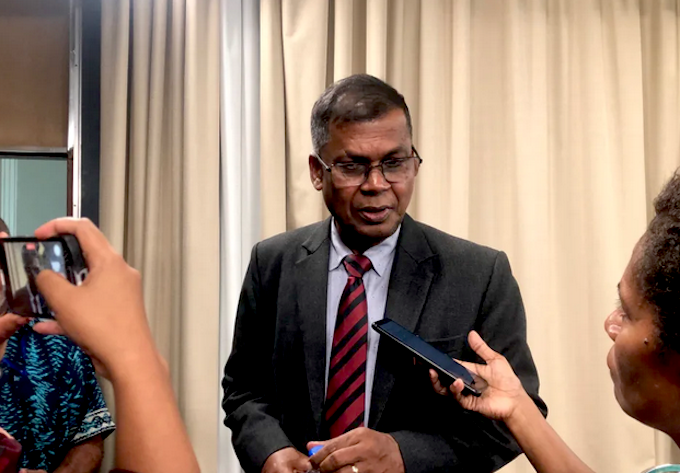
By Kaya Selby, RNZ Pacific journalist
The Fiji government is spending big on this year’s budget.
The country’s Deputy Prime Minister and Minister for Finance, Biman Prasad, unveiled a FJ$4.8 billion (about NZ$3.5 billion) spending package, complete with cost of living measures and fiscal stimulus, to the Fijian Parliament on Friday.
This is about F$280 million more than last year, with the deficit widening to around $886 million.
Dr Prasad told Parliament that his government had guided the country to a better economic position than where he found it.
“When we came into office we were in a precarious economic crossroad . . . our first priority was to restore macroeconomic stability, rebuild trust in policymaking institutions, and chart a path towards sustainable and inclusive growth.”
The 2025/2026 budget consisted of a spending increase across almost every area, with education, the largest area of spending, up $69 million to $847 million overall.
The health sector received $611.6 million, the Fijian Roads Authority $388 million, and the Police force $240.3 million, all increases.
A package of cost of living measures costing the government $800 million has also been announced. This includes a value-added tax (VAT) cut from 15 percent to 12.5 percent on goods and services.
Various import duties, which firms pay for goods from overseas, have been cut, such as chicken pieces and parts (from 42 to 15 percent) and frozen fish (from 15 to 0 percent).
A subsidy to reduce bus fares by 10 percent was announced, alongside a 3 percent increase in salaries for civil servants, both beginning in August.
Drastic international conditions
In a news conference, Dr Prasad said that responding to difficult global economic shocks was the primary rationale behind the budget.
“This is probably one of the most uncertain global economic environments that we have gone through. There has been no resolution on the tariffs by the United States and the number of countries, big or small,” he said.
“We have never had this kind of interest in Fiji from overseas investors or diaspora, and we are doing a lot more work to get our diaspora to come back.”
When asked why the VAT was cut, reducing government revenue and widening the deficit, Dr Prasad said there was a need to encourage consumer spending.
“If the Middle East crisis deepens and oil prices go up, the first thing that will be affected will be the supply chain . . . prices could go up, people could be affected more.”
On building resilience from global shocks, Dr Prasad said the budget would reduce Fiji’s reliance on tourism, remittances, and international supply chains, by building domestic industry.
“It kills two birds in one [stone]. It addresses any big shock we might get . . . plus it also helps the people who would be affected.”
In their Pacific Economic Update, the World Bank projected economic growth of 2.6 percent in 2025, after a slump from 7.5 percent in 2023 to 3.8 percent in 2024.
Senior World Bank economist Ekaterine Vashakmadze told RNZ that Fiji was an interesting case.
“Fiji is one of the countries that suffered the sharpest shock [post-covid] . . . because tourism stopped.”
“On the other hand, Fiji was one of the first countries in the Pacific to recover fully in terms of the output to pre-pandemic level.”
Deficit too high — opposition
Opposition members have hit out at the government over the scale of the spend, and whether it would translate into outcomes.
Opposition MP Alvick Maharaj, in a statement to local media outlet Duavata News, referred to the larger deficit as “deeply troubling”.
“The current trajectory is concerning, and the government must change its fiscal strategy to one that is truly sustainable.”
“The way the budget is being presented, it’s like the government is trying to show that in one year Fiji will become a developed country.”
MP Ketal Lal on social media called the budget “a desperate cloak for scandal” designed to appeal to voters ahead of elections in 2026.
“This is what happens when a government governs by pressure instead of principle. The people have been crying out for years. The Opposition has consistently raised concerns about the crushing cost of living but they only act when it becomes politically necessary. And even then, it’s never enough.”
He also pointed out, regarding the 3 percent increase in civil servants salaries, that someone earning $30,000 a year would only see a pay increase of $900 per year.
This article is republished under a community partnership agreement with RNZ.












































